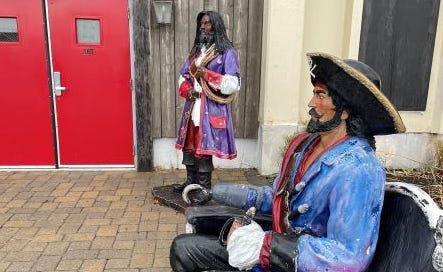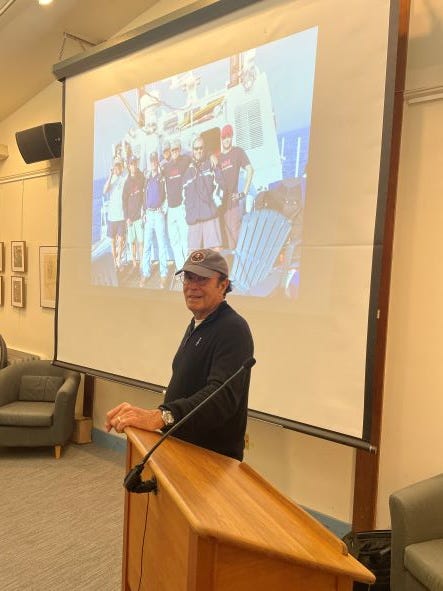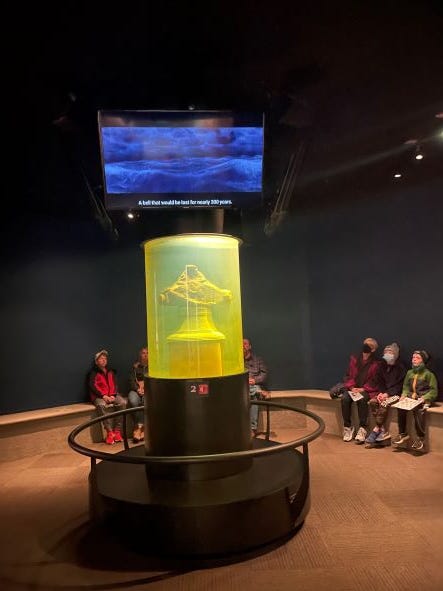How Barry Clifford reinvented ‘treasure’
The modern definition includes promotion, piracy as interracial democracy – and sure, throw in a pegleg and hook!
*****
The pirate museum on Route 28 in West Yarmouth was jamming Friday afternoon after Thanksgiving.
Two statues outside seemed to stand (and sit) guard, one with stereotyped pegleg and hook. Inside, parents were trying to keep kids from grabbing for gold doubloons, silver knuckle protectors, and weapon handles. Video recounted Sam Bellamy’s life and demise on the Whydah in 1715 plus other pirate history, punctuating exhibits insisting that pirate ships were the first-ever integrated and democratic mini-societies.
In the back room, artifacts encased within centuries-old concretion sat under dripping fresh water to slowly dissolve them free.
There were homages to the man whose vision and tenacity launched all this, Barry Clifford. When Barry announced in 1984 that he had found the pirate ship Whidah, as he spelled it then, a few hundred feet off the beach in Wellfleet, I was among those who figured this to be a hustle, albeit a great and creative one.
To this day I find myself wondering sometimes, but walking through that museum, seeing so many artifacts from jewelry to spoons and plates, coins, cannon, the ship’s bell, I suspend disbelief.
Barry has long had pirate aspects to his personality; that’s karmically appropriate. He also did something sophisticated and amazing:
He redefined, in modern context, what ‘treasure’ really is.
He realized that the trove would be his ability to parlay, market, promote himself and the story, attract National Geographic to do a documentary, get on the front page of Parade Magazine, pen promotion deals, create a museum that charges $17 a head. He says he has never sold a single artifact, traded one doubloon for cash -- though maybe at times he wished he could have.
He knew his attempt to re-write pirate history into a tale of integration and social equality would resonate. I’m not saying this was cynical, and have no idea if it’s true (though a museum note that in pirate society “the captain had no special privileges” does not jive for anyone who has ever been on a boat). But it seems possible, sure was savvy, and Barry makes no skull and crossbones about it:
“Escaped slaves experimenting in democracy, that’s the treasure of the Whydah,” he told a fascinated crowd in Wellfleet earlier this year.
Barry grew up around Brewster; an uncle’s tall tales pointed him to the wrecked ship. By all accounts (including his own) he was on the wild side. He spent time on Martha’s Vineyard, where some encounters led to mixed feelings -- not hardcore bad, more a sense of rogue, living on the edge.
I wrote about some of this decades ago in a now-defunct magazine called New England Monthly, and soon after was drinking a beer with my friend Joanne at the Land Ho! in Orleans. Barry saw me and stalked over, fuming, saying he had a mind to take me out in the parking lot after what I had written about him. Affronted, I asked Joanne to save my seat and followed him out the door.
Once outside, nose to nose, I said that if there was one thing I’d written that wasn’t true, I’d print a retraction — period, end of story. Then I stalked back into the bar and sat down to the disappointment of those congregated by the window who were hoping for fisticuffs (Barry surely would have taken me out in about five seconds).
That night, long after closing time, my phone rang. It was Barry, apologizing.
The story dovetails with his self-deprecating comment to a rapt gathering sponsored by the Wellfleet Historical Society, where he’s promised to donate some haul:
“After we found the Whydah’s bell, proof positive, my phone rang for months with calls from owners of restaurants saying, ‘Barry! Sorry! I didn’t mean to throw you out! Come back!’”
He always wanted to be larger than life; he named his research boat “The Vast Explorer,” the next one “The Vast Explorer II.” He reveled in having young John Kennedy diving with him. He would regale with stories of treasure from the African coast to the Caribbean and even Boston Harbor, where he claimed he might have located remnants of The Boston Tea Party that helped start the American Revolution.
So when he says there are 187,000 artifact cards documented from the Whydah, with 61 cannon, hundreds of millions of dollars of plunder still buried under the shifting seafloor off Wellfleet (despite more than three decades of his team’s work there), it might be perfectly true or it might be blended with hucksterism, a showman’s exaggeration.
Either way, his credibility has solidified and is now on display: The museum, on Route 28 in West Yarmouth, has amazing stuff in it, fascinating relics and recoveries.
“If that museum were in London, we’d be doing a million people a year,” says Barry.
There we go again.
But that’s OK. Indulge the hustle, smile at the pegleg and hook. Give Barry Clifford and his crew their very big due.
Haven’t subscribed yet? To keep seeing a Voice (a cool trick), please support this local expression:










In defense of pirate "democracy"... Having held original 17th century source documents in my hands, I'd say that the claim of "no special privileges" for pirate captains refers not to who has the last say concerning commands routine to running the ship. Instead, it correctly means that the crew got to vote on lots of big policy questions (where to go, what to steal). The captain was still in command and evidence of this is that William Kidd's crew had to basically mutiny to get him to turn pirate. But once he did, they had a big say in how to proceed.
This article has prompted me to see this museum in 2023.